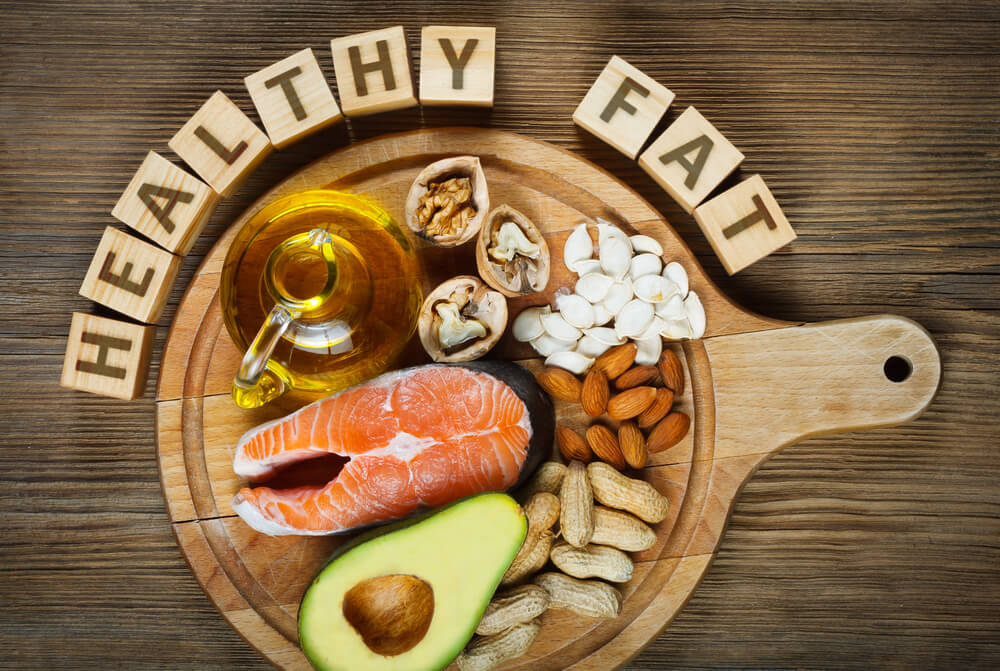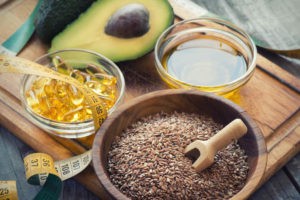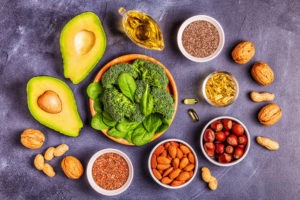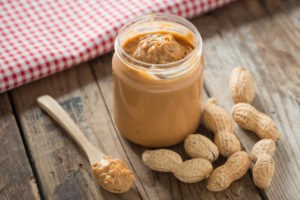The Benefit Of Healthy Fats In Your Diet

It’s only natural to try and avoid foods with the word “fatty” or “fat” in it when dieting, but that isn’t always the best way to approach weight loss. While the rule of thumb of avoiding fatty foods works quite well, it definitely doesn’t apply to healthy fats or essential fatty acids, which are actually quite beneficial to your health and very conducive to weight loss.
Below, NJdiet provides information about how healthy fat and fatty acids
can
actually be beneficial to your health, as well as aid in your weight loss journey!
Incorporating Healthy Fats Into Your Diet
A well-balanced eating plan doesn’t mean cutting out all fat, you just need to focus on healthier varieties. A general goal is for 20-35% of your total daily calories to come from healthy fats (such as polyunsaturated and monounsaturated fats) and fewer than 10% of calories per day from saturated fats.
The Omegas
Omega-3 fats are a type of polyunsaturated fatty acid that may offer health benefits, such as:
- Promoting normal functions of the brain and nervous system
- Lowering cholesterol levels and supporting heart health
- Protecting against dry eye disease
- Prevent and reduce symptoms of depression, ADHD, and bipolar disorder
- Protect against memory loss and dementia
- Reduce the risk of cancer
- Ease arthritis, joint pain, and inflammatory skin conditions
- Support a healthy pregnancy
- Battle fatigue, sharpen your memory, and balance your mood
Since our bodies cannot make omega-3 fatty acids, we must get them through he foods we eat. For example, eggs, milk, and soy drinks may be fortified with omega-3s.
Foods That Incorporate Omega-3s
- Fatty Fish: Include fish high in omega-3 fats at least twice per week. For example, salmon, herring, sardines, lake trout, and Atlantic or Pacific mackerel.
- Walnuts: Walnuts are a plant-based source of omega-3 fatty acids. Add walnuts to cereal, salads or muffins.
- Flaxseed: Your body cannot break down whole flaxseeds to access the omega-3-containing oil, so to get the health benefits, select ground flaxseed. Add it to breakfast cereal, yogurt, baked goods, or mixed dishes and casseroles.
- Chia seeds: These small seeds are packed with nutrients. In addition to omega-3s, they contain protein, dietary fiber and vitamins and minerals. Toss them in in your cereal, salads and baked goods.
- Hemp seeds: These seeds are also packed with omega-3s and protein. They can be eaten raw, cooked or toasted.
- Eggs: Some chickens are given feed that is high in omega-3s so their eggs will contain more as well. When buying eggs, check the package label.
Monounsaturated And Polyunsaturated Fats
Monounsaturated fats and polyunsaturated fats are known as the “good fats” because they are good for your heart, your cholesterol, and your overall health. These fats can help to:
- Lower the risk of heart disease and stroke.
- Lower bad LDL cholesterol levels, while increasing good HDL.
- Prevent abnormal heart rhythms.
- Lower triglycerides associated with heart disease and fight inflammation.
- Lower blood pressure.
- Prevent atherosclerosis (hardening and narrowing of the arteries).
These healthy fats help to increase HDL, the “good” cholesterol in the body. Swapping out monounsaturated or polyunsaturated fats, such as vegetable oils, for saturated fats, such as butter and lard, may help reduce cholesterol in the body. Cholesterol is a waxy substance that can build up and clog blood vessels. The narrowed or blocked blood vessels increase your risk for heart attack or stroke.
Foods That Incorporate Monounsaturated Fats
- Nuts: In addition to heart-healthy fats, nuts (unsalted) are a good source of protein, dietary fiber and a variety of vitamins and minerals. Just keep portion control in mind: one portion of nuts is equal to 1 ounce and provides approximately 160 to 180 calories.
- Oils: Use oils such as olive and canola in place of solid fats such as butter. Use oil in salad dressing or to cook vegetables, seafood, poultry, meat or tofu.
- Avocado: Avocados not only contain monounsaturated fat, but they also are packed with dietary fiber, potassium and vitamins (folate and vitamins B6, C and E). Try adding avocado to salad, pizza, soup, salsa, eggs and sandwiches.
- Peanut Butter: Nearly half the fat in natural peanut butter is monounsaturated fat. Don’t pour off the heart-healthy oil that’s separated out of natural peanut butter, and mix it in.
Foods That Incorporate Polyunsaturated Fats
- Seeds And Nuts: Aside from being a great source of healthy fats, nuts and seeds offer a wealth of benefits for our bodies. Regularly eating them can help lower bad LDL cholesterol to keep your arteries clear and your heart healthy. Nuts and seeds are also considered brain foods, and certain types are even recommended to help improve mood and defeat depression. Flaxseed, Sunflower, Sesame, and Pumpkin Seeds and Walnuts are all good examples.
- Fatty Fish/Fish Oil: Fatty fish varieties like salmon, sardines, mackerel and anchovies are packed with heart-healthy fatty acids that are absolutely crucial to health. These fats are considered essential fatty acids because the body isn’t capable of producing them on its own, which means we must rely on these foods in our diet to supply these key compounds.
- Tofu: The American Heart Association recommends eating tofu, soymilk and other forms of soybeans, including their oils. These foods contain alpha-linolenic acid (ALA), another omega-3 fatty acid.
- Safflower Oil: Safflower oil is a rich source of unsaturated fatty acids. The unsaturated fats in safflower oil can thin the blood and make platelets less sticky, helping prevent blood clots that can lead to heart attack and stroke. Safflower oil might also affect blood vessels by relaxing them and reducing blood pressure.
The Benefits Of Incorporating Healthy Fats
Mental Clarity
Whether you incorporate them naturally into your diet or take supplements, fatty acids, such as omega-3, are an excellent way to educe inflammation of the brain and produce neurotransmitters, which the brain relies on. When you get enough good fatty acids in your diet, you’ll find that you think more clearly, have better decision making skills, and that your attention span is longer, not to mention the fact that regular ingestion of essential fatty acids has been shown to reduce the risk of Alzheimer’s disease and dementia.
Reduced Risk of Heart Disease
Studies have shown that taking in enough essential fatty acids can lower your triglyceride levels. What does that mean? For starters, your body and brain will be healthier overall, but perhaps the most excellent benefit is that your risk of heart disease and other heart problems will be greatly reduced.
Look and Feel Better
Another excellent benefit of regularly consuming enough essential fatty acids is that they improve the appearance of your skin, hair, and nails. Fatty acids contain the building blocks that these different parts of the body require to shine and look their best, so no matter what your weight, you’ll look a hundred times better and healthier when you’re getting your daily dose of fatty acids.
Weight Loss
While there is no “miracle pill” to make excess weight come off without effort, scientific studies have shown that getting enough fatty acids in your diet can aid in your weight loss efforts. If you’re worried about the calories that foods with fatty acids can add, you can achieve the same benefits by simply taking 1-2 all-natural fish oil tablets per day.
Pain Reduction
If you’ve ever skipped your workouts because of stiff, sore muscles or joint pain, then essential fatty acids may be just what you need. Adding a healthy dose of these (or fish oil tablets) into your diet has been shown to reduce joint and muscle pain, even when it’s caused by arthritis, and even to make anti-inflammatory drugs more effective!
* * *
As you can see, there are a great many benefits to getting more fatty acids, such as those found in salmon and other healthy fish, walnuts, and flax seeds, into your diet. Healthy fats are an essential part of our diets. However it is important to note that since some foods which incorporate healthy fats are also higher in calories, we need to account for that by making modifications to your diet in other ways.
Adding plenty of nutritious fats to your diet is just one piece of the puzzle when it comes to health. Be sure to round out your diet with plenty of foods that are high in protein, as well as a good variety of fruits, vegetables, legumes and whole grains to make sure you’re meeting your nutritional needs. In addition, balancing your well-balanced diet with regular physical activity and a balanced lifestyle will help to achieve your optimal health!
NJdiet is here to help you lose weight and get healthier! Every
factor regulating metabolism, appetite, fat storage & fat burning is carefully energetically tested for success. Using DNA Testing over 40 different factors are assessed genetically. We help you not only keep the fat off, but to stay healthy.
Our program is not only aimed at promoting healthy weight loss, but aims to improve your total wellness — where the side effect is weight loss, but the end result is better overall health and well being!
At your initial evaluation and consultation at NJ
Diet, we will explain how many metabolic factors are assessed to genetically make sure you not only lose the weight, but ensures you keep it off and stay healthy for a lifetime.
Attending the Initial Evaluation and Consultation is normally $99, but by registering on our website it will only cost $27!
We welcome the opportunity for you to have a consultation with us, so register online now!







